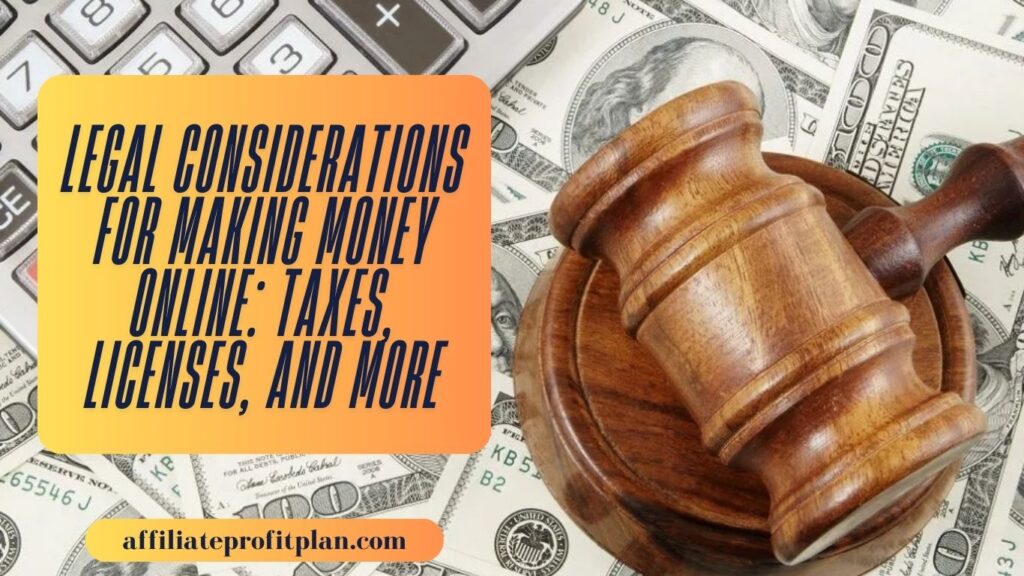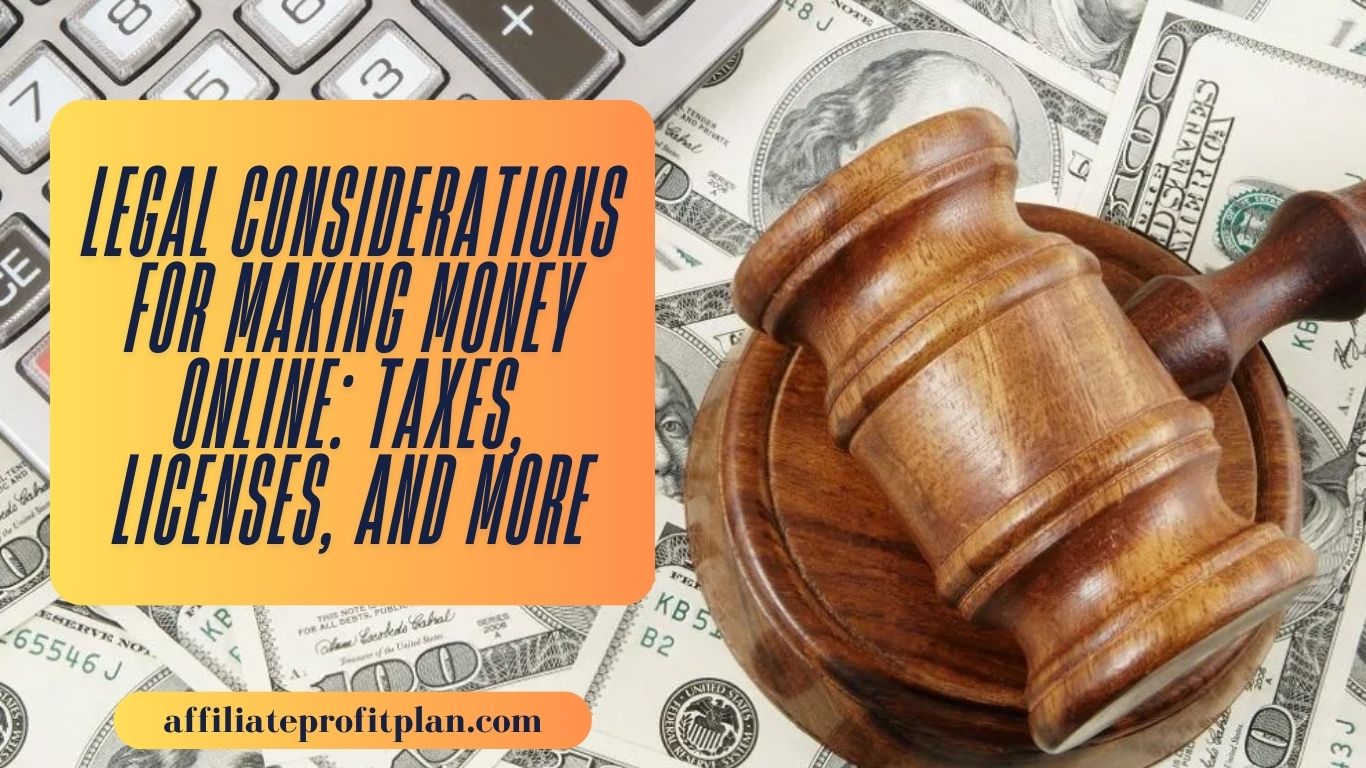Welcome to my article Legal Considerations for Making Money Online: Taxes, Licenses, and More. Making money online can feel like a dream come true—working from your couch, setting your own hours, and having the freedom to choose your projects. But before you kick back with your laptop and start raking in the cash, there’s one thing that can quickly turn your online empire into a legal nightmare: the law. Yes, as much as we love the digital age and its convenience, there are some legal rules and regulations that come with making money online. And no, ignoring them won’t magically make them disappear. In fact, they’ll probably come back to bite you when you least expect it.
By the end, you’ll know how to navigate the legal landscape of online entrepreneurship with confidence. After all, the last thing you want is to find out the hard way that your side hustle could cost you way more than you bargained for! Let’s dive in and get you legally savvy, so you can focus on what really matters: growing your business.
Access My Proven Blueprint for $50-$100 Daily Income – Watch This FREE Video Now >>>

Understanding Online Income Tax Obligations
Taxes. The one thing nobody loves to talk about, but everybody has to deal with. When you’re making money online, it’s easy to get swept up in the excitement of your growing business or side hustle. But here’s a friendly reminder: Uncle Sam isn’t going to ignore your success. Whether you’re freelancing, selling products, or raking in cash through affiliate marketing, understanding your online income tax obligations is crucial to keeping the IRS from knocking on your door with a hefty fine (and a serious side-eye).
Let’s start with the basics: if you’re making money, you’re likely taxable. The amount you owe depends on various factors, including how much you earn, the type of income you receive, and whether you’re working as an independent contractor or running a business. So, whether you’re pocketing a few hundred bucks or scaling up to a full-blown e-commerce empire, knowing how taxes work will save you from any unpleasant surprises.
Types of Online Income and Their Tax Implications
First off, it’s important to understand the types of online income you might be earning. Here are a few examples of common income streams and how they’re taxed:
- Freelance Work (Consulting, Writing, Graphic Design, etc.): If you’re offering your services on platforms like Upwork or Fiverr, you’ll be considered a self-employed individual, which means you’re responsible for paying both income tax and self-employment tax (this is the part that helps fund Social Security and Medicare). You’ll get a 1099 form from any company that pays you over $600 in a year, and you’ll need to report this income on your tax return.
- E-commerce and Sales: If you sell physical or digital products through your own website or platforms like Etsy or Shopify, that’s considered business income. You may be required to pay sales tax, depending on your location and where your customers are. This varies by state, so make sure you check your local laws. Additionally, if you’re running an online store, you may need to register your business and obtain a business license.
- Affiliate Marketing: Making money by promoting products on your blog or YouTube channel? That’s affiliate income, and it’s taxable too. You’ll report this income on your tax return, and if you make over a certain amount, you might also receive a 1099 form from the affiliate networks.
Keeping Track of Your Earnings and Expenses
Now that we’ve got the basic taxes out of the way, it’s time to talk about how you can keep your online money-making venture tax-friendly. The key here is documentation. Keep track of all your earnings, whether it’s a PayPal deposit or a check from a client. And don’t forget to log your business expenses, like equipment, software, or even that new laptop you bought for content creation (yes, that can be a deductible expense). The more organized you are, the easier your tax filing will be—plus, it could lead to some nice tax deductions that lower your overall tax bill.
Paying Estimated Taxes
Here’s a fun fact: if you’re self-employed and earning money online, the IRS expects you to pay taxes throughout the year, not just at the end. Sounds like a fun surprise, right? But don’t worry, you can avoid any nasty shocks by paying quarterly estimated taxes. These are payments made four times a year to cover your income and self-employment taxes. If you don’t pay enough throughout the year, you might face penalties. But if you’ve kept track of your income, it’s easy to calculate your estimated tax payments and avoid the headache come tax season.
Final Thoughts
When it comes to taxes, knowledge is power. Understanding your obligations early on not only keeps you in the good books with the IRS, but it also helps you make smarter business decisions. Whether you’re making money from freelancing, e-commerce, or affiliate marketing, setting aside a percentage of your earnings for taxes and staying on top of your filing requirements will save you a ton of stress (and possibly a lot of money) down the road. So, take a deep breath, grab that calculator, and start planning—because when it comes to taxes, it’s better to be ahead of the game than caught off guard.
Business Structures and How They Affect Your Taxes
So, you’ve decided to take the plunge and turn your online hustle into a full-fledged business—congrats! Now, before you start building your empire, there’s one important decision you need to make: What business structure should you choose? It’s not exactly as glamorous as picking out your business name or designing a logo, but it’s crucial. The structure you choose will influence your taxes, your liability, and how much paperwork you’ll be drowning in at the end of the year. Don’t worry, though—we’ll break it down for you in a way that’s easy to understand (and yes, a little bit of humor to make it bearable).
The Solo Act: Sole Proprietorship
Let’s start with the simplest and most common structure: the sole proprietorship. If you’re a one-person show (maybe you’re a freelancer, a blogger, or running a small e-commerce store), this is the default business structure. Think of it like flying solo on a road trip: you’re in control, but you’re also responsible for everything.
When you choose a sole proprietorship, you report your business income and expenses on your personal tax return (Form 1040 and Schedule C). This means your business is considered an extension of yourself, and the IRS taxes you as an individual. The benefit? It’s easy and cheap to set up—no formal paperwork or fees required (unless you need a business license in your state).
However, there’s a downside: self-employment tax. Since the IRS sees your business and personal income as one, you’re responsible for paying both income tax and self-employment tax (which covers Social Security and Medicare). This can add up, so be sure to set aside some savings throughout the year to cover your tax bill.
The Dynamic Duo: Partnership
Next, let’s say you’re teaming up with a partner to make this online money-making thing happen. A partnership is a business structure where two or more people share ownership. Partnerships are simple to form, but they do require a partnership agreement that outlines how profits, losses, and responsibilities will be divided. Think of it like a buddy cop movie—each of you brings something to the table, but you’ll need to make sure you’re on the same page about how things will run.
From a tax perspective, a partnership is a pass-through entity, which means the income passes through to the individual partners, who report it on their personal tax returns. The catch here is that each partner must pay self-employment taxes on their share of the income. So, while you won’t face corporate taxes, you’ll still be responsible for paying your fair share of the taxes as individuals.
The Small Business Powerhouse: LLC (Limited Liability Company)
If you’re ready to level up and protect your personal assets (like, say, that shiny new MacBook you’re working on), a Limited Liability Company (LLC) could be your best bet. An LLC combines the benefits of a sole proprietorship (simple setup and tax pass-through) with the added bonus of limited liability. Translation: if your business gets sued, your personal assets (like your home or car) are generally protected.
For tax purposes, LLCs are also pass-through entities, meaning income is reported on your personal return, and you avoid double taxation. However, there’s a caveat: depending on how much money you’re making, you may be subject to self-employment tax. But here’s the good news—an LLC can elect to be taxed as an S-corp, which allows you to pay yourself a salary and potentially reduce your self-employment tax burden. This is where things get a little tricky (but also magical), so it’s worth consulting a tax professional if you’re considering this route.
The Corporate Route: S-Corp and C-Corp
Alright, now we’re talking big leagues. If you plan to scale your online business and have big dreams of attracting investors, then you might want to consider setting up an S-Corp or a C-Corp. These are more complex structures, but they offer some serious perks—like the ability to issue stock and attract investors (goodbye, bootstrapping!).
- S-Corp: This structure allows you to have limited liability while being taxed as a pass-through entity. The key perk here is that, as an owner, you can pay yourself a salary and avoid paying self-employment tax on the business’s profits. However, you’ll need to meet certain requirements and file extra paperwork to maintain your S-Corp status.
- C-Corp: If you’re planning to go full corporate and eventually take your company public, a C-Corp might be the way to go. The downside? You’ll face double taxation—once at the corporate level and again when profits are distributed to shareholders. But if you’re planning to reinvest most of your profits back into the business, the C-Corp structure might still make sense for you.
The Tax Implications of Your Choice
Now, how does all this affect your taxes? Well, each business structure comes with its own set of tax responsibilities. Sole proprietorships and partnerships are taxed on a pass-through basis, meaning profits are taxed on your personal return. LLCs are generally the same unless you opt for S-Corp treatment, which could help lower your self-employment taxes. C-Corps face double taxation, but they offer more opportunities to reinvest profits without facing personal tax penalties.
Ultimately, the right choice depends on your business goals, the amount of income you expect to earn, and how much protection you need. But don’t worry—whether you choose to go solo or recruit a partner, there’s always room to adjust as your business grows.
Final Thoughts
Choosing the right business structure is like picking the perfect pair of shoes—there’s no one-size-fits-all. It all depends on your goals, your income, and how much risk you’re willing to take on. Whether you go for the simplicity of a sole proprietorship or the protection of an LLC, understanding the tax implications of each structure will help you make a more informed decision. So, get your business paperwork in order, pick your structure, and then get back to what really matters: turning your online venture into a success story.
Licenses and Permits You Might Need to Operate Legally
Alright, so you’ve got your online business up and running, your products are flying off the virtual shelves, and everything is looking great. But before you get too carried away and start planning your acceptance speech for “Best Online Entrepreneur of the Year,” let’s pause for a reality check: Do you have all the licenses and permits you need to operate legally?
Access My Proven Blueprint for $50-$100 Daily Income – Watch This FREE Video Now >>>
Now, I know what you’re thinking: “Licenses? Permits? I’m just selling stuff online!” But trust me, even though your business may exist in the digital space, it’s still subject to the same laws and regulations as a brick-and-mortar business. Think of licenses and permits as the unseen superheroes that keep your business legit and avoid the dreaded IRS ninja strike—or worse, a visit from a local inspector. Here’s what you need to know:
1. Business License: Your Golden Ticket
In most cases, you’ll need a business license to operate legally, even if you’re working from the comfort of your living room. The specific requirements vary depending on your location, industry, and the nature of your business. A business license is essentially your golden ticket to show the government that you’re running a legitimate business, and not just creating chaos on the internet (no matter how fun that chaos might be).
Typically, a business license is required by your local city or county government. It’s an easy way for them to keep track of who’s operating in their area—and also ensures you’re following local zoning laws and regulations. The best part? Applying for a business license is often straightforward and can be done online in many cases.
2. Sales Tax Permit: Collecting What You Owe
If you’re selling products (whether physical or digital), you might be required to collect sales tax from your customers. This is where a sales tax permit comes in handy. This permit allows you to legally collect sales tax on behalf of your state. Not every state requires sales tax, but most do, so it’s important to check the laws in the state where you’re doing business. If you’re selling to customers in different states, you’ll need to be familiar with nexus laws—which determine whether you have a tax obligation in other states based on factors like having a physical presence or reaching a certain sales threshold.
Let’s say you’re selling online courses or downloadable e-books. Many states tax these kinds of digital products, and if you don’t collect the appropriate tax, you could end up in hot water with the state’s tax authorities. Having a sales tax permit is your way of keeping things above board and avoiding penalties down the road.
3. Home Occupation Permit: Working From Home, Legally
Running your business from home? In that case, you might need a home occupation permit. Even if you’re not planning on inviting customers to your living room, many local governments require this permit to ensure that businesses operating from home don’t cause disturbances in residential areas (because the last thing you want is for your neighbors to get all up in arms about your online business).
Typically, home occupation permits are required if you have a physical presence at your home that could affect zoning laws. For instance, if you’re running a business that involves shipping products and getting a lot of deliveries, or if you’re meeting clients in person, this could trigger the need for a permit. These permits are typically easy to obtain and, in many cases, might only require you to fill out a short application and agree to certain conditions—like not having signage outside your house or limiting traffic.
4. Industry-Specific Licenses and Permits: Niche Matters
This is where things get a bit more specific. Depending on what type of business you’re running, you might need additional industry-specific licenses or permits. For example:
- Health-related businesses (like a fitness coaching business) might require certifications or licenses related to safety, health regulations, or insurance.
- Food-based businesses (like an online food delivery service or food blogging) will need food safety permits and potentially health inspections.
- Travel agencies or real estate businesses often require special certifications or licenses depending on your location.
If you’re unsure whether you need a specialized permit, it’s worth checking with your local licensing office or industry-specific regulators. Better safe than sorry!
5. Employer Identification Number (EIN): Not Just for Employees
You might have heard of an Employer Identification Number (EIN), and while it sounds like something only large corporations need, it’s actually a smart move for many small business owners too. This nine-digit number is issued by the IRS and acts as your business’s Social Security number. Even if you don’t have employees, an EIN is often required if your business is structured as an LLC or corporation. Plus, it helps you separate your personal and business finances—which is key for tax purposes.
While an EIN is usually free to obtain, it’s important to note that having one makes your business look more official, which could help build credibility with customers, partners, and even financial institutions if you decide to apply for a loan. So even if you’re running a one-person show, getting an EIN is a good move to make your business look, well, like a real business.
6. International Sales: Crossing Borders Legally
Running a global business? If you’re selling to international customers, things can get a bit more complicated. You may need to understand different countries’ sales tax rules, import/export regulations, and even digital product licensing laws. For example, if you’re selling to customers in the European Union, you’ll need to comply with the EU VAT (Value-Added Tax) laws, which apply to digital products and services. If you’re not compliant, the EU can come down hard on you, and you definitely don’t want that.
Final Thoughts
Licenses and permits might not be the most exciting part of running an online business, but they are a vital part of making sure you’re operating on the up-and-up. Think of them as the backstage pass to your business’s legitimacy. Taking the time to research what licenses and permits apply to your business will not only keep you compliant, but it’ll also save you from some potentially nasty legal headaches down the road. So, go ahead—check off those permits from your to-do list and get back to doing what you do best: making money online!
Protecting Your Intellectual Property Online
The sweet satisfaction of coming up with a brilliant idea, turning it into a product, and then launching it to the world. But wait—before you sit back and enjoy the fruits of your genius, let’s take a moment to talk about something that’s a little less glamorous but just as crucial: protecting your intellectual property (IP).
Intellectual property is your creative baby—whether it’s a product, a blog post, a logo, a design, or a business idea. And just like any good parent, you want to protect it from the bad guys. In the digital age, where ideas can spread like wildfire and copycats lurk behind every corner, safeguarding your IP online is a must. So, how do you do that? Let’s dive in.
1. Copyright: Your Creative Shield
If you’re creating original content—whether it’s written material, graphics, music, or even software—copyright is your first line of defense. Copyright automatically grants you the exclusive right to use, distribute, and reproduce your creative works. In other words, if you’ve written a blog post, shot a YouTube video, or designed an eBook cover, the moment you create it, you own it. No one else can legally reproduce or distribute your work without your permission.
Now, here’s the thing: while copyright protection is automatic, registering it with the U.S. Copyright Office (or the equivalent in your country) adds an extra layer of legal protection. If someone decides to steal your work (yep, it happens), a registered copyright gives you a stronger legal standing in court. Plus, you can seek statutory damages and attorney’s fees—so, in some cases, you might actually make money from your thief (not the worst situation, right?).
2. Trademarks: Guarding Your Brand Identity
Imagine spending hours creating the perfect logo for your online business. It’s sleek, it’s memorable, and it perfectly represents your brand. Now, imagine someone else using your logo or a very similar one to make themselves look legit. Not cool, right? That’s where trademarks come in.
A trademark protects words, phrases, logos, and even sounds that identify your business or product. For example, if you have a unique brand name or logo, registering it as a trademark ensures no one else can legally use it without your permission. Trademarks are particularly important if you plan on building a recognizable brand in the long term. So, if you’re serious about making your mark online (and I mean, really serious), getting a trademark should be high on your to-do list.
Trademarks also protect you from someone else registering a similar name or logo that could confuse customers or lead to brand dilution. Plus, if you ever get into a dispute, a trademark helps establish that you were the first to use the mark, making it easier to enforce your rights.
3. Patents: Protecting Your Products and Inventions
Got a killer idea for a physical product or an innovative digital tool that no one has ever seen before? Patents could be your best friend. A patent gives you the exclusive right to manufacture, sell, and distribute your invention for a certain period (usually 20 years in the U.S.). So if you’ve developed a new product or technology, a patent stops anyone else from copying or profiting off your idea.
However, patents can be tricky to secure—they involve a detailed application process and often require you to disclose how your invention works, which could expose your idea to competitors. But if you’ve got something truly groundbreaking on your hands, a patent can be a game-changer in protecting your innovation and keeping your competitors at bay.
It’s important to note that patents are typically for tangible inventions or processes, so if your business involves unique methods or tools (like software, for example), you might want to consider software patents or trade secrets (more on those soon). Patents also don’t apply to general ideas or abstract concepts—so you’ve got to have something new and specific to protect.
4. Trade Secrets: The Silent Guardian
Not every business idea needs to be patented or trademarked. Some businesses thrive on keeping certain elements of their operation under wraps, like formulas, processes, or strategies. That’s where trade secrets come into play. Trade secrets are confidential information that gives your business a competitive edge, like the recipe for Coca-Cola or your proprietary algorithm.
If you have a secret sauce to your business success (whether it’s a unique marketing strategy, customer list, or proprietary software), you’ll want to protect it with a trade secret agreement. This is essentially a legal mechanism that prevents employees, contractors, and business partners from disclosing or using your secrets. The key to protecting trade secrets is to maintain confidentiality and implement measures like non-disclosure agreements (NDAs) to ensure that your intellectual property stays under lock and key.
Unlike patents or trademarks, trade secrets don’t require registration—they’re protected by law simply by virtue of being kept secret. But once your trade secret is exposed or becomes public knowledge, the protection disappears. So, it’s all about keeping that information under wraps!
5. Contracts and Agreements: The Legal Buffer
When it comes to protecting your IP, having solid contracts and agreements in place is essential. Whether you’re hiring freelancers, partnering with other entrepreneurs, or working with influencers, your contracts should outline who owns the rights to the work being created and how that work can be used.
For instance, if you’re hiring a freelancer to create content for your website, you’ll want a clear work-for-hire agreement that stipulates that the content belongs to you once it’s completed. Similarly, if you’re collaborating with others, you’ll want to make sure that intellectual property rights are clearly outlined, so there’s no confusion down the road.
Think of contracts as your preemptive strike to avoid IP-related headaches. A well-drafted agreement sets expectations and protects your assets, so you don’t find yourself in a legal battle over ownership when things go south.
Final Thoughts
Protecting your intellectual property online is like installing a security system for your digital empire. It might not be as exciting as creating the next viral product, but it’s an essential step in ensuring that your hard work doesn’t get hijacked by opportunistic copycats. Whether it’s copyrighting your content, trademarking your brand, or keeping your trade secrets safe, there are plenty of ways to safeguard what’s rightfully yours. So, go ahead, get those protections in place, and let your creativity flow freely—knowing that your intellectual property is under lock and key.
Understanding Consumer Protection Laws and Online Compliance
Running a successful online business is a thrill. You’ve got customers clicking “buy,” your products are flying off the virtual shelves, and the money’s rolling in. But hold on a second—before you start planning your victory lap, let’s take a moment to discuss something just as important as your sales strategy: consumer protection laws and online compliance. No, it’s not as exciting as watching your revenue grow, but trust me, it’s crucial for keeping your business out of the legal hot water.
Consumer protection laws exist to ensure that businesses treat their customers fairly, disclose necessary information, and offer products that are safe and as described. In the online world, this can mean a whole lot of regulations that you need to stay on top of. After all, a happy customer is a repeat customer, but a customer with a complaint—and the legal tools to act on it—can quickly derail your online business.
1. Truth in Advertising: The Fine Line Between Clever and Deceptive
Ever seen an ad for a product that promises to change your life in 30 days? Maybe it’s a weight loss pill or a “miracle” kitchen gadget. While flashy claims are tempting (who doesn’t want to sell a life-changing product?), they can land you in hot water if they aren’t backed by solid evidence. This is where truth in advertising laws come into play.
In most countries, including the U.S. and EU, businesses are required to provide accurate and truthful information in their advertising. This means no exaggerating benefits or making unrealistic claims about your products. The Federal Trade Commission (FTC) in the U.S. is particularly vigilant about misleading or false advertising, and violations can lead to hefty fines. So, if you’re promoting a product, make sure you have the facts to back up any bold claims. If your product does, in fact, “change lives,” just make sure you can prove it with some solid reviews or credible data.
Also, it’s important to disclose if you’re paid to promote something—like in affiliate marketing. Transparency is key. If your audience feels deceived, not only might they sue, but they’ll likely abandon your brand, too. And let’s be honest, bad publicity is far worse than a missed sale.
2. Privacy Protection: Don’t Mess With Customer Data
When you run an online business, chances are you’re collecting personal data from your customers—name, email, payment details, maybe even their shoe size for that super personalized service you offer. While it’s fantastic that your customers trust you with this information, you’ve got a responsibility to protect it.
Enter privacy laws. Regulations like the General Data Protection Regulation (GDPR) in the EU and the California Consumer Privacy Act (CCPA) are designed to give consumers more control over how their data is collected, stored, and used. These laws require you to obtain clear consent before collecting personal data, store it securely, and allow consumers to access, modify, or delete their information if they choose.
In addition to fines, violating privacy laws can damage your reputation. In an age where customers care deeply about how their personal data is handled, a security breach or mishandling of sensitive information can lead to a public relations nightmare. So, make sure you’re storing data securely and following all necessary protocols. A breach isn’t just a business loss; it’s a credibility killer.
3. Return and Refund Policies: What’s Required and What’s Smart
Imagine buying a pair of shoes online, only to find out they don’t fit. Or worse, they’re nothing like the pictures. Return and refund policies are where the rubber hits the road when it comes to consumer protection. Not only do you want to keep your customers happy, but you also want to stay compliant with the law.
In many jurisdictions, consumers have the right to a cooling-off period—a specific window of time during which they can cancel their purchase and get a full refund. For example, under EU consumer protection laws, customers have up to 14 days to return most online purchases without needing to give a reason. Even in the U.S., some states have specific regulations about returns for online goods. So, make sure you’re clear on your obligations based on where your customers are located.
Now, just because you’re legally required to accept returns doesn’t mean you should make it a free-for-all. Be sure to outline your policy clearly on your website, including any conditions—like whether items need to be unopened or in original condition for a return. If you have a no-returns policy (as some digital products might), be transparent about it and make sure it’s visible to customers before they check out.
4. E-Commerce and Payment Processing Compliance: Keeping It Legal and Secure
Online businesses depend heavily on payment processors, but have you ever stopped to think about e-commerce compliance when it comes to handling payments? From PCI DSS (Payment Card Industry Data Security Standard) compliance to anti-money laundering (AML) regulations, there’s a lot to consider when you’re processing payments online.
To protect consumers, payment processors and businesses alike are required to ensure secure transactions. This means safeguarding sensitive information and keeping up with all relevant security standards. Not to mention, some regions and payment platforms have rules about handling digital currency or cross-border transactions. Make sure that you understand these rules, or you might find your business banned from certain payment processors or dealing with fines.
Also, don’t forget about tax compliance in your payments—especially if you’re dealing with international customers. Different tax rates apply based on where the consumer is located, so it’s essential to ensure you’re charging the right amount and reporting your income accordingly. If you’ve ever considered selling internationally, this is one area where things can get really tricky.
5. Consumer Rights and Online Dispute Resolution: What to Do When Things Go Wrong
Let’s face it: no matter how great your product or service is, things can still go wrong. Maybe the product breaks, a delivery is late, or a customer simply isn’t happy with their purchase. This is where consumer rights and online dispute resolution come in handy.
If a customer isn’t satisfied, they often have the right to request a refund, replacement, or repair. And while most customers will reach out to you in good faith, some might take it a step further and file complaints with consumer protection authorities, which could result in fines or even legal action. To avoid a disaster, make sure you offer a clear dispute resolution process. That might involve a customer support team ready to address issues quickly, or even a formal arbitration process if the situation escalates.
The key to managing complaints is not only to be compliant with the law but also to make sure that your customer feels heard. By offering great customer service and being transparent about your policies, you’re likely to turn a negative experience into a positive one that results in a loyal customer.
Final Thoughts
Navigating the world of consumer protection laws and online compliance can feel like you’re running an obstacle course while blindfolded. But staying on top of these legal considerations is crucial if you want to protect your business—and your customers. From understanding your advertising obligations to ensuring customer data is secure, a little knowledge and proactive effort can go a long way in keeping your online business smooth and legal. Stay compliant, stay transparent, and remember: when it comes to consumer protection, everyone wins.
Conclusion: Stay Legal, Stay Successful
You’ve launched your online business, and things are looking great—sales are coming in, your audience is growing, and your products are getting rave reviews. But here’s the reality check: none of that matters if you don’t stay on the right side of the law. The last thing you want is to be caught off guard by legal issues that could jeopardize all your hard work.
Access My Proven Blueprint for $50-$100 Daily Income – Watch This FREE Video Now >>>
The key to long-term success in the online world isn’t just about offering a great product or service—it’s about building your business on a solid, legal foundation. Whether you’re handling taxes, protecting your intellectual property, or complying with consumer protection laws, being proactive about these legal considerations will not only keep you out of trouble but also help you build trust with your customers. And let’s face it, trust is the ultimate currency in the digital marketplace.
But don’t worry—staying compliant doesn’t have to be a headache. With the right resources and a little bit of legal know-how, you can ensure your business is ticking all the right boxes. So, take the time to educate yourself on the rules, get those licenses and permits in order, and make sure you’re safeguarding your customer’s privacy. The more you focus on doing things the right way, the more your customers will appreciate you, and the more your business will thrive.
Remember: success isn’t just about how much you make, but how you make it. Stay legal, stay ethical, and you’ll not only build a lasting business but also set yourself up for years of growth and prosperity. After all, as they say, “the best way to predict the future is to create it”—and creating a legal and compliant future is the smartest way to go. Now, go ahead and take that victory lap—but make sure you’ve dotted all your legal i’s and crossed all your t’s first!
Thanks a lot for reading my article on “Legal Considerations for Making Money Online: Taxes, Licenses, and More” till the end. Hope you’ve helped. See you with another article.










